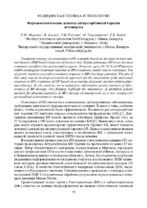| dc.contributor.author | Морозик, П. М. | ru |
| dc.contributor.author | Алекна, В. | ru |
| dc.contributor.author | Руденко, Э. В. | ru |
| dc.contributor.author | Тамулайтене, М. | ru |
| dc.contributor.author | Кобец, Е. В. | ru |
| dc.coverage.spatial | Минск | ru |
| dc.date.accessioned | 2021-02-03T08:20:23Z | |
| dc.date.available | 2021-02-03T08:20:23Z | |
| dc.date.issued | 2020 | |
| dc.identifier.citation | Фармакогенетические аспекты антирезорбтивной терапии остеопороза / П. М. Морозик [и др.] // Сотрудничество - катализатор инновационного роста : сборник материалов 6-го Белорусско-Балтийского форума, Минск, 22–23 декабря 2020 года / Белорусский национальный технический университет. – Минск : БНТУ, 2020. – С. 75-77. | ru |
| dc.identifier.uri | https://rep.bntu.by/handle/data/85377 | |
| dc.description.abstract | Treatment strategy of osteoporosis (OP) is mainly based on increase in bone mineral density (BMD) and reduction of fracture risk. Bisphosphonates (BPs) are the most commonly used first-line antiresorptive agents. However, up to 30–50% of OP patients exhibit inadequate treatment response to BPs treatment, mainly due to resistance. Use of genetic markers to predict treatment response to BPs has huge potential. The aim of this study was to develop personalized approach for the assessment of the individual response to BPs treatment of OP based on screening of genetic markers before pharmacotherapy. By the analysis, we revealed four informative genetic markers of effectiveness of BP therapy. Our findings highlight the importance of identified genetic markers for pharmacogenetics of BPs therapy of osteoporosis as a new strategy for personalized antiresorptive therapy. | ru |
| dc.language.iso | ru | ru |
| dc.publisher | БНТУ | ru |
| dc.title | Фармакогенетические аспекты антирезорбтивной терапии остеопороза | ru |
| dc.type | Working Paper | ru |

